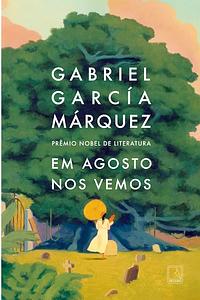You need to sign in or sign up before continuing.
Take a photo of a barcode or cover
emotional
reflective
medium-paced
Plot or Character Driven:
Character
Strong character development:
Yes
Loveable characters:
Complicated
Diverse cast of characters:
No
Flaws of characters a main focus:
Yes
Definitivamente no ha sido mi favorito de Gabriel García Márquez pero estuvo bueno, me gustó. Tal vez estoy algo sesgado porque me gusta mucho la forma en la que escribe, pero pienso que es un buen libro, aunque algo corto.
His kids should have respected his wishes and left this unpublished.
I am absolutely honoured to have read Gabo's final book. I was sceptical when I picked it up in the library because it is clear that the most amazing author of all time (in my opinion) did not want this novella finished because of the state his mind was in towards the end of his life. However, Gabriel Garcia Marquez is the reason why I love literature, was the gateway to my favourite genre (magical realism) and my favourite source of books(Latin America). This novella is perfect in all of its imperfections. It sounds unfinished, it has flaws here and there, but it in no way hides the gorgeous beauty of Gabo's unique writing. It is a final love letter from the author to love itself. I read it over a single one and a half hour flight, it is short, sweet, sexy and special due to being the last work of a master, published 10 years after this death.
reflective
fast-paced
Plot or Character Driven:
Character
Strong character development:
Yes
Loveable characters:
Complicated
Diverse cast of characters:
No
Flaws of characters a main focus:
Yes
August 16 each year. A ferry, a hotel, a taxi, a bouquet of gladioli and at her mother’s grave in the poorest cemetery of the island is Ana Magdelena Bach. Each year, part of her routine, a metronome of a schedule to pay respects to her mother (even if her wishes were odd to be buried on this island). Ana is otherwise content in her life– a happy marriage, the usual drama of raising independently-minded children, and generally ageing (although soon coming up to the age her mother passed away).
But then…
August 16– the ferry, the hotel, the taxi, the gladioli, cleaning her mother’s grave– Ana takes a lover for a single night on the island. And the next year, and the next. The routine initially excites her before turning somewhat sour– is it the men? or the hotel room? or her dress? Her freedom of being the woman on the island turns into a forced self-reckoning of who she is for the rest of the year.
Until August is, of course, not just about the story drafted by Gabriel García Márquez but an interesting case study of a ‘Lost Novel’ (as advertised on the cover). Should we, as readers, writers, editors or careholders of ‘lost novels’ of authors cherished by the world, resurrect the untold stories? You can tell that an effort of treating the original document as a foundation, with a tone familiar to García Márquez’s other novels, and a lot of care went into this book. However, it begs the question that if the author, whose final judgement was that this book ‘doesn’t work’ and ‘must be destroyed’ (viii), asks for a book not to be released, should have their wish granted?
As a newcomer to the magical realism genre and Gabriel García Márquez, the artistry and perfectionism that goes into the craft of his novels is unimaginable. From reading the preface and some of the comments left in the original manuscript, he sounded incredibly controlling over his work, and what I imagine many authors would feel when unable to continue writing. In the preface, he mentions the importance of memory as his ‘source material and tool’ and that without his memory, ‘there’s nothing’ (vii). A truly heartbreaking reality of what the author was going through. With this prior knowledge, I read the novel more so out of interest of what can be pieced, woven and brought together in this situation.
The pivotal moment, the ‘grand finale’ as it was referred to as in a comment on the manuscript, is the third to last paragraph of the story. I won’t spoil what this scene is, but to me, it feels like a very familiar scene in a García Márquez book with a circular story plot, a character’s intense self-reflection and reckoning of their situation. The scene almost stands outside of the story's context, time or place in a resonating way. Until August draws me more for the interest in the background of the book than the story itself– and directs the question of should readers demand the resurrection of Lost Novels.
But then…
August 16– the ferry, the hotel, the taxi, the gladioli, cleaning her mother’s grave– Ana takes a lover for a single night on the island. And the next year, and the next. The routine initially excites her before turning somewhat sour– is it the men? or the hotel room? or her dress? Her freedom of being the woman on the island turns into a forced self-reckoning of who she is for the rest of the year.
Until August is, of course, not just about the story drafted by Gabriel García Márquez but an interesting case study of a ‘Lost Novel’ (as advertised on the cover). Should we, as readers, writers, editors or careholders of ‘lost novels’ of authors cherished by the world, resurrect the untold stories? You can tell that an effort of treating the original document as a foundation, with a tone familiar to García Márquez’s other novels, and a lot of care went into this book. However, it begs the question that if the author, whose final judgement was that this book ‘doesn’t work’ and ‘must be destroyed’ (viii), asks for a book not to be released, should have their wish granted?
As a newcomer to the magical realism genre and Gabriel García Márquez, the artistry and perfectionism that goes into the craft of his novels is unimaginable. From reading the preface and some of the comments left in the original manuscript, he sounded incredibly controlling over his work, and what I imagine many authors would feel when unable to continue writing. In the preface, he mentions the importance of memory as his ‘source material and tool’ and that without his memory, ‘there’s nothing’ (vii). A truly heartbreaking reality of what the author was going through. With this prior knowledge, I read the novel more so out of interest of what can be pieced, woven and brought together in this situation.
The pivotal moment, the ‘grand finale’ as it was referred to as in a comment on the manuscript, is the third to last paragraph of the story. I won’t spoil what this scene is, but to me, it feels like a very familiar scene in a García Márquez book with a circular story plot, a character’s intense self-reflection and reckoning of their situation. The scene almost stands outside of the story's context, time or place in a resonating way. Until August draws me more for the interest in the background of the book than the story itself– and directs the question of should readers demand the resurrection of Lost Novels.
Márquez schreef In augustus zien we elkaar aan het einde van zijn leven, toen hij niet meer zo helder van geest was. Hij vond het manuscript niet goed genoeg om uit te geven ('het moet vernietigd worden', zei hij zelfs), maar zijn zoons haalden het van onder het stof en publiceerden het postuum toch. In augustus zien we elkaar is duidelijk onaf. Ik ben een ongelooflijke fan van Márquez, dus ik kan de imperfectie goed plaatsen en vind het zelfs aandoenlijk. Maar het voelt wrang dat Gabo dit zelf niet gewild heeft.
medium-paced
adventurous
emotional
lighthearted
medium-paced
Plot or Character Driven:
Character
Strong character development:
Yes
Loveable characters:
Complicated
Diverse cast of characters:
Yes
Flaws of characters a main focus:
No
Interesting.
I really enjoyed reading this! I liked that there was an introduction from his sons about this being a manuscript for a longer novel and explaining the choices made in publishing it. Because of that the little inconsistencies did not bother me in the slightest. It is not as refined as other works of Garcia Marques I've read, but in this manuscript you can already see what a great book this could have been, and it was still a beautiful and engaging story.






